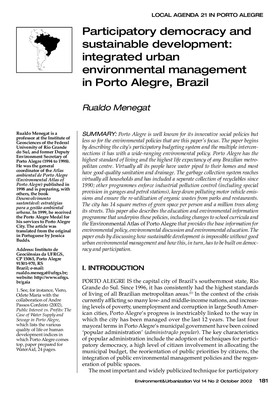Participatory democracy and sustainable development: integrated urban environmental management in Porto Alegre, Brazil

Porto Alegre is well known for its innovative social policies but less so for the environmental policies that are this paper’s focus. The paper begins by describing the city’s participatory budgeting system and the multiple interconnections it has with a wide-ranging environmental policy. Porto Alegre has the highest standard of living and the highest life expectancy of any Brazilian metropolitan centre. Virtually all its people have water piped to their homes and most have good-quality sanitation and drainage. The garbage collection system reaches virtually all households and has included a separate collection of recyclables since 1990; other programmes enforce industrial pollution control (including special provision in garages and petrol stations), keep down polluting motor vehicle emissions and ensure the re-utilization of organic wastes from parks and restaurants. The city has 14 square metres of green space per person and a million trees along its streets. This paper also describes the education and environmental information programme that underpins these policies, including changes to school curricula and the Environmental Atlas of Porto Alegre that provides the base information for environmental policy, environmental discussion and environmental education. The paper ends by discussing how sustainable development is impossible without good urban environmental management and how this, in turn, has to be built on democracy and participation.
Cite this publication
Available at https://www.iied.org/g00519